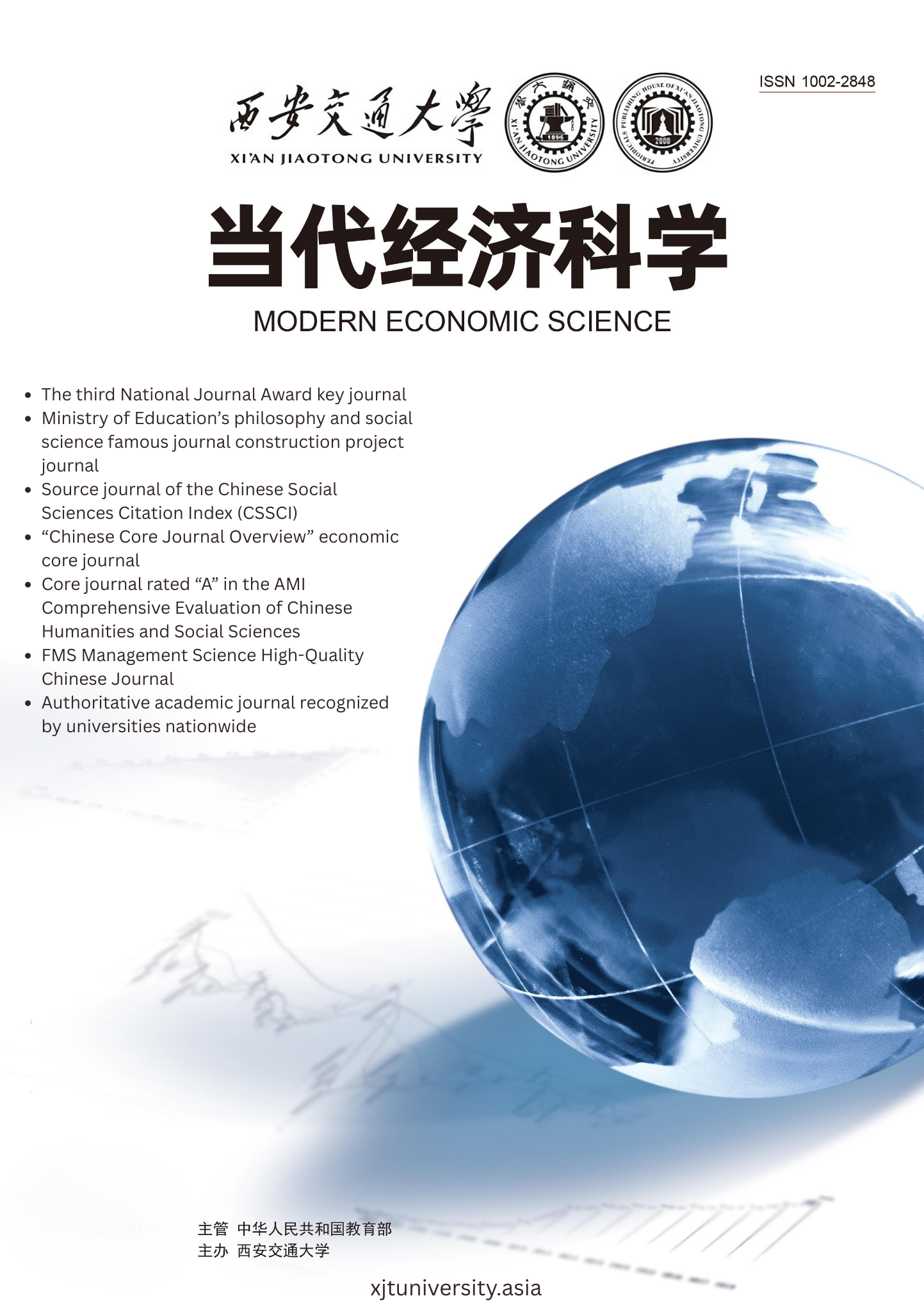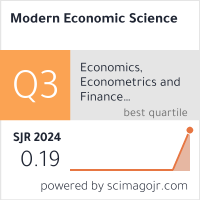Inter-Regional Trust and Migrant Entrepreneurship
DOI:
https://doi.org/10.20069/gh4px255Keywords:
inter-regional trust, migrant entrepreneurship, employment stabilization, informal institution, social network, social identity, information disseminationAbstract
Amidst complex domestic and international situations and multiple unexpected factors, demand in China’s labor market has declined, creating a relatively challenging employment landscape. Under the policy directive of “strengthening the employment-first policy orientation and treating stable employment as a key indicator of the economy operating within a reasonable range,” stabilizing employment has become a top government priority. Migrant entrepreneurship not only solves their own employment issues and increases personal income levels but also creates additional job opportunities, promotes urban development, and drives economic growth, making it one of the critical measures for the government to “stabilize employment” and “ensure employment.”
Using data from the China Migrants Dynamic Survey (CMDS) from 2011 to 2017, this study finds that inter-regional trust significantly promotes migrant entrepreneurship, effectively increasing entrepreneurial probability. This conclusion remains robust after a series of tests, including instrumental variable regression, controlling for omitted variables, adjusting sample sizes, and validating with other micro-level datasets. Furthermore, mechanism analysis reveals that inter-regional trust primarily facilitates migrant entrepreneurship by enhancing social identity, expanding social networks, and promoting information dissemination, thereby uncovering the underlying reasons. Additionally, heterogeneity analysis indicates that the impact of inter-regional trust is more pronounced in regions with higher marketization levels, better e-government and digital economic development, and stronger collectivist and inclusive cultures, suggesting that it complements both formal and informal institutions. Moreover, as an informal social capital, inter-regional trust significantly influences survival-oriented entrepreneurship and entrepreneurship among low-income groups.
The marginal contributions of this study are threefold: First, it enriches research on the impact of inter-regional trust on microeconomic behaviors. Existing literature primarily examines the effects of inter-regional trust on macroeconomic outcomes such as trade and investment between countries or provinces and its relationship with corporate behaviors, with less attention to its significant role in individual micro-level behaviors, which this paper extends. Second, unlike studies that focus on the impact of social trust within a single country or region on entrepreneurial decisions, this paper explores the influence of inter-regional trust on migrant entrepreneurship from the perspective of trust between destination and origin provinces, thereby supplementing the literature on trust and entrepreneurial decision-making. Finally, while existing research mainly focuses on factors such as the household registration system, credit constraints, clan culture, and social networks affecting migrant entrepreneurship, studies on inter-regional trust as an informal institution are relatively scarce. This paper provides a new perspective.
This research contributes to understanding the significant role of inter-regional trust in promoting migrant entrepreneurship and its underlying mechanisms. It offers potential decision-making support for the government in formulating policies to support migrant entrepreneurship, with practical implications for stimulating entrepreneurial vitality, alleviating employment pressure, and promoting high-quality economic development.
Downloads
References
[1] 宁光杰,段乐乐. 流动人口的创业选择与收入:户籍的作用及改革启示[J]. 经济学(季刊),2017,16(2):771-792.
NING G J, DUAN L L. Entrepreneurship choice and income of floating population: the role of hukou and implications for reform[J]. China Economic Quarterly, 2017, 16(2):771-792.
[2] GLAESER E L, KERR S P, KERR W. Entrepreneurship and urban growth: an empirical assessment with historical mines[J]. The Review of Economics and Statistics, 2015, 97(2):498-520.
[3] ARROW K J. The limits of organization[M]. New York: W.W. Norton & Company, 1974:23.
[4] BOTTAZZI L, RIN M D, HELLMANN T. The importance of trust for investment: evidence from venture capital[J]. The Review of Financial Studies, 2016, 29(9):2283-2318.
[5] 林建浩,辛自强,范佳琳,等. 中国省际双边信任模式及其形成机制[J]. 经济学(季刊),2018,17(3):1127-1148.
LIN J H, XIN Z Q, FAN J L, et al. Interprovincial bilateral trust patterns in China: formation mechanism[J]. China Economic Quarterly, 2018, 17(3):1127-1148.
[6] GUISO L, SAPIENZA P, ZINGALES L. Cultural biases in economic exchange?[J]. The Quarterly Journal of Economics, 2009, 124(3):1095-1131.
[7] KWON S W, HALEBLIAN J, HAGEDOORN J. In country we trust? National trust and the governance of international R&D alliances[J]. Journal of International Business Studies, 2016, 47(7):807-829.
[8] 杨继彬,李善民,杨国超,等. 省际双边信任与资本跨区域流动:基于企业异地并购的视角[J]. 经济研究,2021,56(4):41-59.
YANG J B, LI S M, YANG G C, et al. Interprovincial bilateral trust and cross-regional capital flow: based on the perspective of cross-regional mergers and acquisitions[J]. Economic Research Journal, 2021, 56(4):41-59.
[9] 张维迎,柯荣住. 信任及其解释:来自中国的跨省调查分析[J]. 经济研究,2002,48(10):59-70.
ZHANG W Y, KE R Z. Trust and its explanation: an analysis of cross-provincial surveys from China[J]. Economic Research Journal, 2002, 48(10):59-70.
[10] XING W, ZHOU L A. Bilateral trust and trade: evidence from China[J]. World Economy, 2018, 41(8):1918-1940.
[11] 曹春方,夏常源,钱先航. 地区间信任与集团异地发展:基于企业边界理论的实证检验[J]. 管理世界,2019,35(1):179-191.
CAO C F, XIA C Y, QIAN X H. Interregional trust and group development in other regions: an empirical test based on the theory of firm boundaries[J]. Journal of Management World, 2019, 35(1):179-191.
[12] 周颖刚,蒙莉娜,林雪萍. 城市包容性与劳动力的创业选择:基于流动人口的微观视角[J]. 财贸经济,2020,41(1):129-144.
ZHOU Y G, MENG L N, LIN X P. Urban inclusiveness and labor entrepreneurship choices: a micro perspective based on floating population[J]. Finance & Trade Economics, 2020, 41(1):129-144.
[13] 盛亦男,尚佳佳,郑浩冉. 宗族文化对流动人口城市创业的影响[J]. 人口研究,2023,47(4):114-128.
SHENG Y N, SHANG J J, ZHENG H R. The impact of clan culture on urban entrepreneurship of floating population[J]. Population Research, 2023, 47(4):114-128.
[14] 叶文平,李新春,朱沆. 地区差距、社会嵌入与异地创业:“过江龙”企业家现象研究[J]. 管理世界,2018,34(1):139-156.
YE W P, LI X C, ZHU H. Regional disparities, social embedding and entrepreneurship in other regions: a study on the phenomenon of “cross-river dragon” entrepreneurs[J]. Journal of Management World, 2018, 34(1):139-156.
[15] FRIJTERS P, KONG T S, MENG X. Migrant entrepreneurs and credit constraints under labor market discrimination[R]. IZA Discussion Paper No.5967, 2025.
[16] 王春超,冯大威. 中国乡—城移民创业行为的决定机制:基于社会关系网的分析视角[J]. 经济学(季刊),2018,17(1):355-382.
WANG C C, FENG D W. The determination mechanism of China’s rural-urban migrant entrepreneurship behavior: an analysis from the perspective of social network[J]. China Economic Quarterly, 2018, 17(1):355-382.
[17] 宋渊洋,赵嘉欣. 地区社会信任对企业股权结构的影响研究:来自CGSS和中国上市公司的经验证据[J]. 当代经济科学,2021,43(4):42-52.
SONG Y Y, ZHAO J X. Research on the impact of regional social trust on corporate equity structure: empirical evidence from CGSS and Chinese listed companies[J]. Modern Economic Science, 2021, 43(4):42-52.
[18] 黄实磊,吴翌琳. 信任格局视角下普遍信任和特殊信任对个体创业的影响研究:兼论地区信任模式的作用[J]. 经济与管理研究,2023,44(11):104-124.
HUANG S L, WU Y L. A study on the impact of universal trust and particularistic trust on individual entrepreneurship from the perspective of trust patterns: also on the role of regional trust models[J]. Research of Economics and Management, 2023, 44(11):104-124.
[19] 周广肃,谢绚丽,李力行. 信任对家庭创业决策的影响及机制探讨[J]. 管理世界,2015,31(12):121-129.
ZHOU G S, XIE X L, LI L X. The impact of trust on household entrepreneurship decisions and mechanism discussion[J]. Journal of Management World, 2015, 31(12):121-129.
[20] 蒲艳萍,袁柏惠,张岚欣. 社会信任与农村劳动力非农就业决策研究[J]. 当代经济科学,2023,45(4):111-126.
PU Y P, YUAN B H, ZHANG L X. Research on social trust and non-agricultural employment decisions of rural labor force[J]. Modern Economic Science, 2023, 45(4):111-126.
[21] 辛素飞,明朗,辛自强. 群际信任的增进:社会认同与群际接触的方法[J]. 心理科学进展,2013,21(2):290-299.
XIN S F, MING L, XIN Z Q. Enhancing intergroup trust: methods of social identity and intergroup contact[J]. Advances in Psychological Science, 2013, 21(2):290-299.
[22] TAJFEL H, TURNER J C. The social identity theory of inter-group behavior[M]. Chicago: Nelson-Hall, 1986:13-19.
[23] AKERLOF G A, KRANTON R E. Economics and identity[J]. The Quarterly Journal of Economics, 2000, 115(3):715-753.
[24] TABELLINI G. The scope of cooperation: values and incentives[J]. The Quarterly Journal of Economics, 2008, 123(3):905-950.
[25] SPOLAORE E, WACZIARG R. The diffusion of development[J]. The Quarterly Journal of Economics, 2009, 124(2):469-529.
[26] 黄玖立,刘畅. 方言与社会信任[J]. 财经研究,2017,43(7):83-94.
HUANG J L, LIU C. Dialect and social trust[J]. Journal of Finance and Economics, 2017, 43(7):83-94.
[27] 王小鲁,胡李鹏,樊纲. 中国分省份市场化指数报告(2021)[M]. 北京: 社会科学文献出版社, 2021:223-225.
[28] 赵涛,张智,梁上坤. 数字经济、创业活跃度与高质量发展: 来自中国城市的经验证据[J]. 管理世界,2020,36(10):65-76.
ZHAO T, ZHANG Z, LIANG S K. Digital economy, entrepreneurial activity, and high-quality development: empirical evidence from Chinese cities[J]. Journal of Management World, 2020, 36(10):65-76.
[29] TALHELM T, ZHANG X, OISHI S, et al. Large-scale psychological differences within China explained by rice versus wheat agriculture[J]. Science, 2014, 344(6184):603-608.
[30] FAN J P H, GU Q, YU X. Collectivist cultures and the emergence of family firms[J]. The Journal of Law and Economics, 2022, 65(S1):S293-S325.
[31] 李叶妍,王锐. 中国城市包容度与流动人口的社会融合[J]. 中国人口·资源与环境,2017,27(1):146-154.
LI Y Y, WANG R. Urban inclusiveness and social integration of floating population in China[J]. China Population, Resources and Environment, 2017, 27(1):146-154.
Published
Issue
Section
License
Copyright (c) 2025 Editorial Board of Modern Economic Science

This work is licensed under a Creative Commons Attribution-NonCommercial 4.0 International License.













